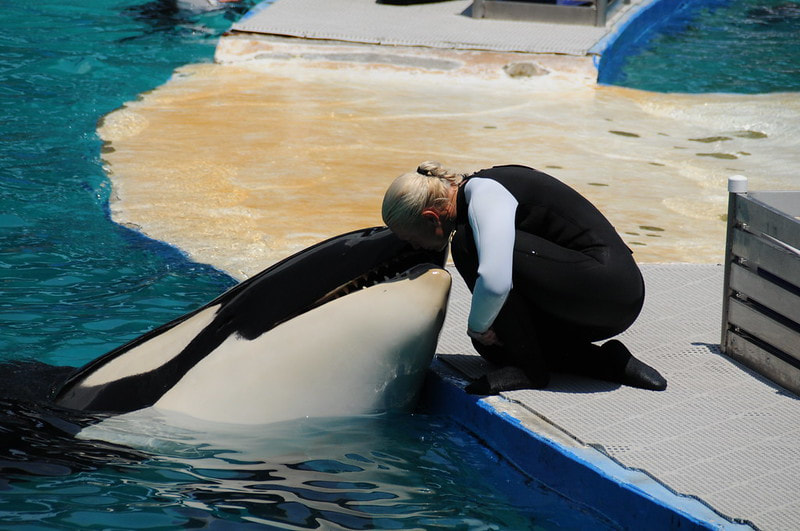|
Back in 1970 in the coastal waters of Washington State, Lolita, also known as Tokitae (Toki), was taken from her pod at about 4 years old before being sold to a Florida aquarium in Miami. Now estimated to be around 57 and the second-oldest killer whale in captivity, the Miami Seaquarium announces their plans to release her after living most of her life in a tank. "For the first time ever, a private company with marine mammals under human care, and a non-profit animal welfare organization, executed a binding agreement with one goal — return the beloved Lolita to her home waters." the announcement made to the Miami Seaquarium's Instagram page reads, in part. The post continues to thank Jim Irsay, the owner of the NFL's Indianapolis Colts, Mayor Daniella Levine Cava, a non-profit known as Friends of Lolita, and everyone else who has been a part the incredible milestone. The aquarium further states that Lolita will receive the highest quality care as the team works to make relocating her possible over the next 18 to 24 months. While one might think that most would be happy to hear that an aquarium is releasing an animal back to its rightful home, this situation does have a few different caveats. Not only has the more than 8,000 pound killer whale relied on human care for more than 50 years, Lolita had fallen ill in recent years, with the Seaquarium's company announcing she would no longer be exhibited in the whale stadium just last year. Puget Sound Orcas were also put onto the endangered species list in 2005; however, animals living in captivity were excluded from protections. It seems the decision has left more of a sour taste in people's mouths than it has sweet. As of publication, the announcement has received nearly 800 likes since it first went up 1 day ago, garnering enough negative comments that they've now been limited — the Seaquarium preventing further public comment in the boxes below. More commenters than not expressed concern about Lolita's well being and survivability after having relied on human care for more than 50 years, some calling the release "very worrisome." "Is this really in her best interests at this time? Health challenges and the stress of being relocated 1,000s of miles? Will she be near her mother? Be able to interact with her? wrote user, @gzf0223. "You just sentenced her to die alone. Awesome Job." remarked @sarazdymond. A few different people seemed to share the same sentiment as @wishingonstarfish, calling the release a political publicity stunt at the expense of the animal. And it appears that experts may share in their concerns. Some have said that it is safer in some cases to keep endangered animals in captivity, with the release of that captive animal putting them at risk of injury or being killed by wild populations of the same species that deem the captive animal as a threat. In a comment to NBC Miami, Marine Biologist, Gerard Loisel, noted that Lolita has had contact with trainers and humans on a daily basis. He wonders how that will affect the orca's life as she ventures off on her own. “The trainers that work with the animal right now at the Seaquarium are very good at what they do, they are very fond of the animal and I think it is going to be an interesting transition to see how that aspect is going to be handled," Loisel said. The Seaquarium has also battled with groups like PETA in court, as well as through the media, regarding Lolita's return to the Pacific Ocean. "After nearly 53 years of exploitation, suffering, & mind-numbing captivity, Lolita may finally find some relief," a statement to PETA's Instagram feed reads, in part. "If Lolita is finally returned to her home waters, there will be cheers from around the world, including from PETA, which has pursued several lawsuits on Lolita’s behalf and battered the Seaquarium with protests demanding her freedom for years." "If the Seaquarium agrees to move her, it’ll offer her long-awaited relief after five miserable decades in a cramped tank and send a clear signal to other parks that the days of confining highly intelligent, far-ranging marine mammals to dismal prisons are done and dusted." The Miami Seaquarium has previously rebutted that Lolita's tank habitat exceeds minimum requirements and regulations as defined by the Animal Welfare Act. On average, orcas live to be about 46 in the wild, and Lolita has now exceeded that by over a decade. Whether or not the decision to release Lolita is the right one, @kendallgirl23's sentiment stands in the hearts of a few other commenters, "It’s the right thing but she going be heavily missed," she writes, "I always watch her she’s my favorite." Do you agree with the decision to release Lolita to the wild, or not? Let us know in the comments. Article by Rachael Volpe
0 Comments
Your comment will be posted after it is approved.
Leave a Reply. |
CATEGORIES |
|
|
Vertical Divider
|
Can't get enough?Uncover more of Florida through our channels below!
|
© COPYRIGHT 2015. ALL RIGHTS RESERVED.


 RSS Feed
RSS Feed